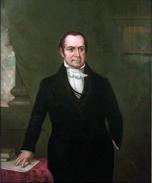
David Porter was an officer in the United States Navy in the rank of captain and the honorary title of commodore. Porter commanded a number of U.S. naval ships. He saw service in the First Barbary War, the War of 1812 and in the West Indies. On July 2, 1812, Porter hoisted the banner "Free trade and sailors' rights" as captain of USS Essex. The phrase resonated with many Americans. Porter was later court martialed; he resigned and then joined and became commander-in-chief of the Mexican Navy. Porter County, Indiana was named after him.

Walter Forward was an American lawyer and politician. He was the brother of Chauncey Forward and Oliver Forward.

Tilghman Ashurst Howard was an American lawyer, politician, and diplomat from Indiana. He was born near Easley, South Carolina. He moved to Knoxville, Tennessee, in 1816 and was admitted to the bar there in 1818. In 1830, he moved to Bloomington, Indiana, and in 1833 to Rockville, Indiana. President Andrew Jackson appointed him US Attorney for Indiana, and he served as such from 1833 to 1839. In 1838, he sought, unsuccessfully, to be elected to the U.S. Senate. He was elected to the United States House of Representatives on August 5, 1839, and served until he resigned on July 1, 1840.

Hezekiah Niles, was an American editor and publisher of the Baltimore-based national weekly news magazine, Niles' Weekly Register and the Weekly Register.
Benjamin Alden Bidlack was an American politician, diplomat, and attorney who served as a member of the US House of Representatives and was later appointed chargé d'affaires to New Granada. While serving in New Granada he negotiated an agreement later known as the Mallarino–Bidlack Treaty. This treaty was the only instance in the nineteenth-century where the United States committed to defend the sovereignty of a Latin American state at the request of that state. The pact helped pave the way for the construction of the Panama Canal.

Almon Heath Read was an American politician who served as a Democratic member of the U.S. House of Representatives for Pennsylvania's 17th congressional district from 1842 to 1843 and Pennsylvania's 12th congressional district from 1843 to 1844. He served in both houses of the Pennsylvania legislature and as Pennsylvania State Treasurer.
Henry Black was a Whig member of the U.S. House of Representatives from Pennsylvania.

Charles Ogle was an Anti-Masonic and Whig member of the U.S. House of Representatives from Pennsylvania.
Lewis Eaton was a United States Congressman from New York.
Edward Rogers was an American lawyer and politician who served one term as a U.S. Representative from New York from 1839 to 1841.

John Randolph Clay was an American diplomat.
Events from the year 1789 in the United States. The Articles of Confederation, the agreement under which the nation's government had been operating since 1781, was superseded by the Constitution in March of this year.

The 1840–41 United States Senate elections were held on various dates in various states. As these U.S. Senate elections were prior to the ratification of the Seventeenth Amendment in 1913, senators were chosen by state legislatures. Senators were elected over a wide range of time throughout 1840 and 1841, and a seat may have been filled months late or remained vacant due to legislative deadlock. In these elections, terms were up for the senators in Class 2.

James Blythe Rogers was a United States chemist.
John Thornton Augustine Washington was a prominent Virginia farmer who served a term in the Virginia House of Delegates. Washington was a grandnephew of George Washington, first President of the United States.
Seth Barton was an American attorney and government official who was active in Alabama and Louisiana. He served the federal government as Solicitor of the United States Treasury and Chargé d'affaires in Chile.
Young Singleton Walter was an American politician from Pennsylvania who served as a Republican member of the Pennsylvania House of Representatives for Delaware County from 1877 to 1880. He established the Delaware County Republican newspaper in 1833 and served as editor for 50 years.
George H. Flood was an American politician and diplomat who served as the second American chargé d'affaires to Texas in 1840 and 1841.
Relations between the Kingdom of Sardinia and the United States began in 1802 with mutual recognition, but formal relations were not established until 1839. Diplomatic relations ceased in 1861 when Sardinia was incorporated into the Kingdom of Italy.
This page is based on this
Wikipedia article Text is available under the
CC BY-SA 4.0 license; additional terms may apply.
Images, videos and audio are available under their respective licenses.








